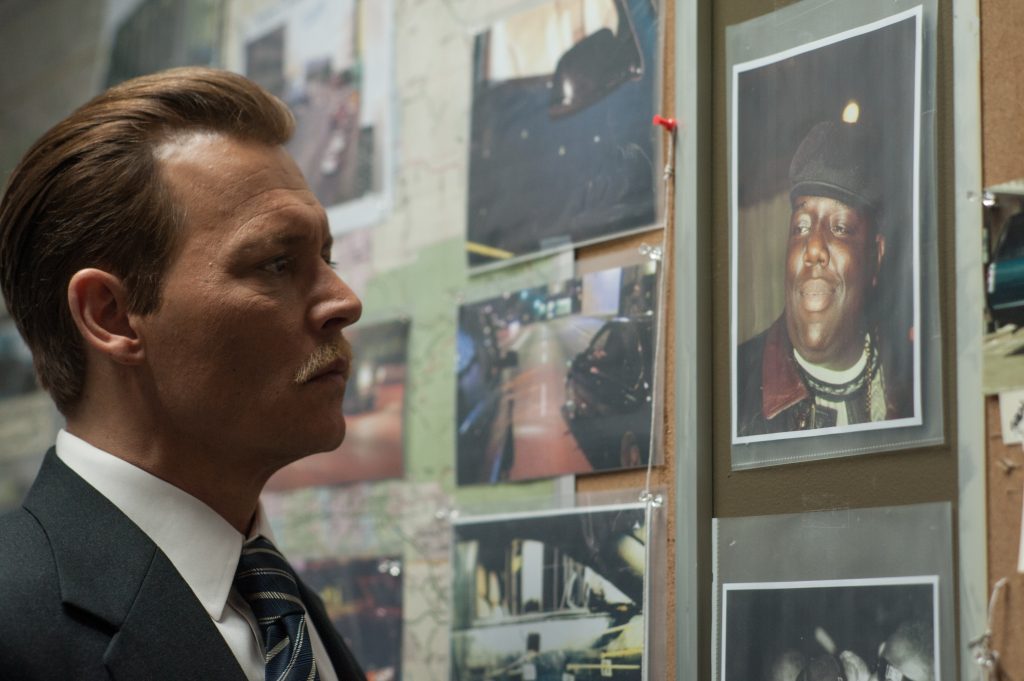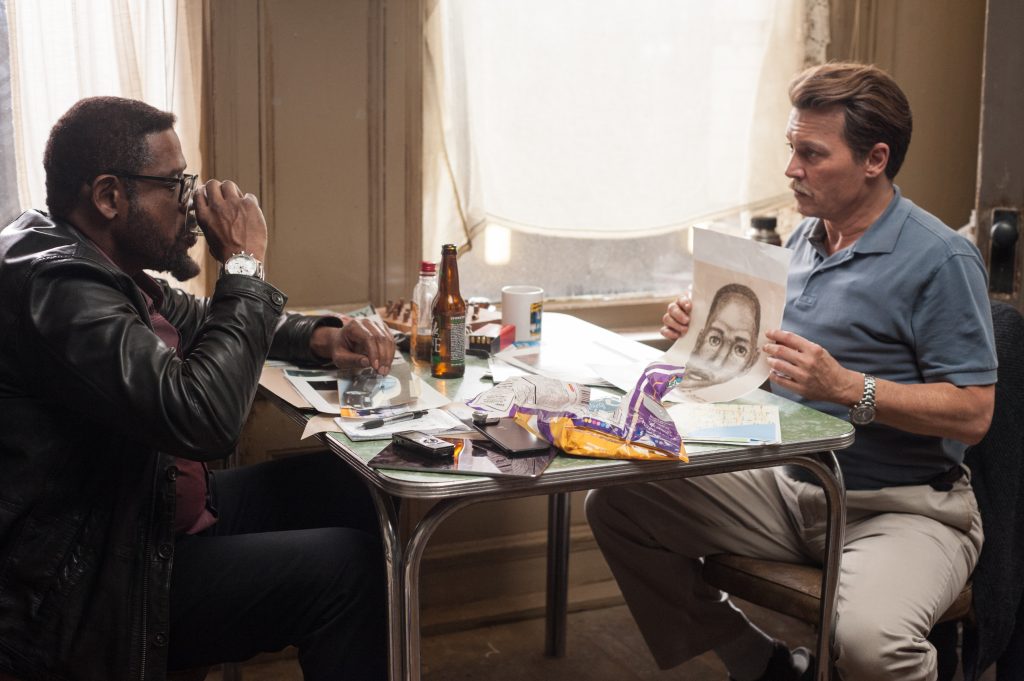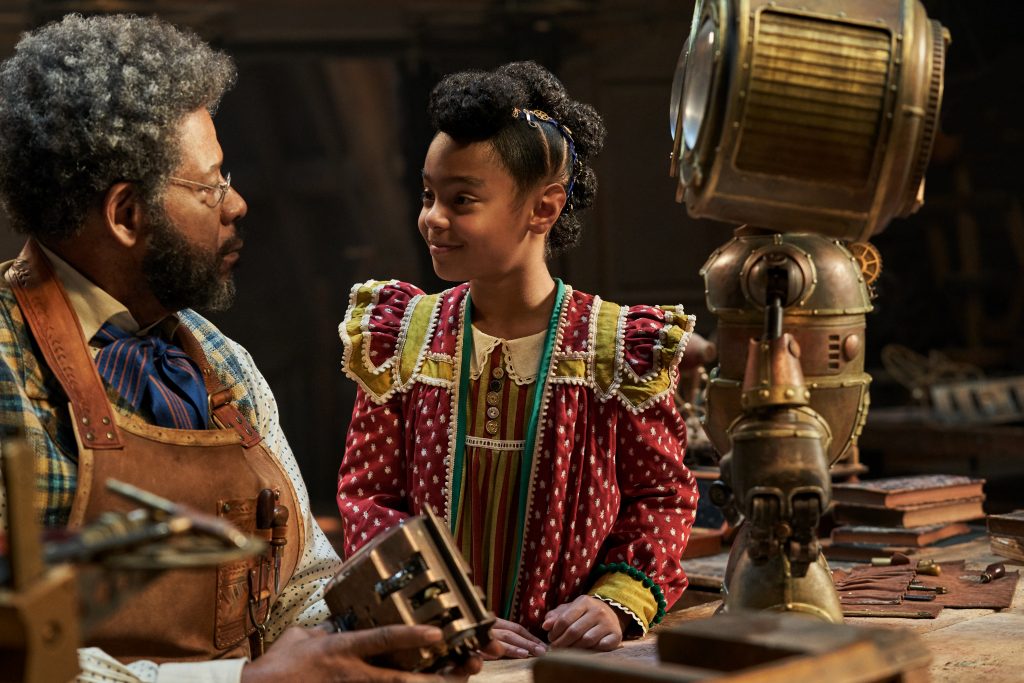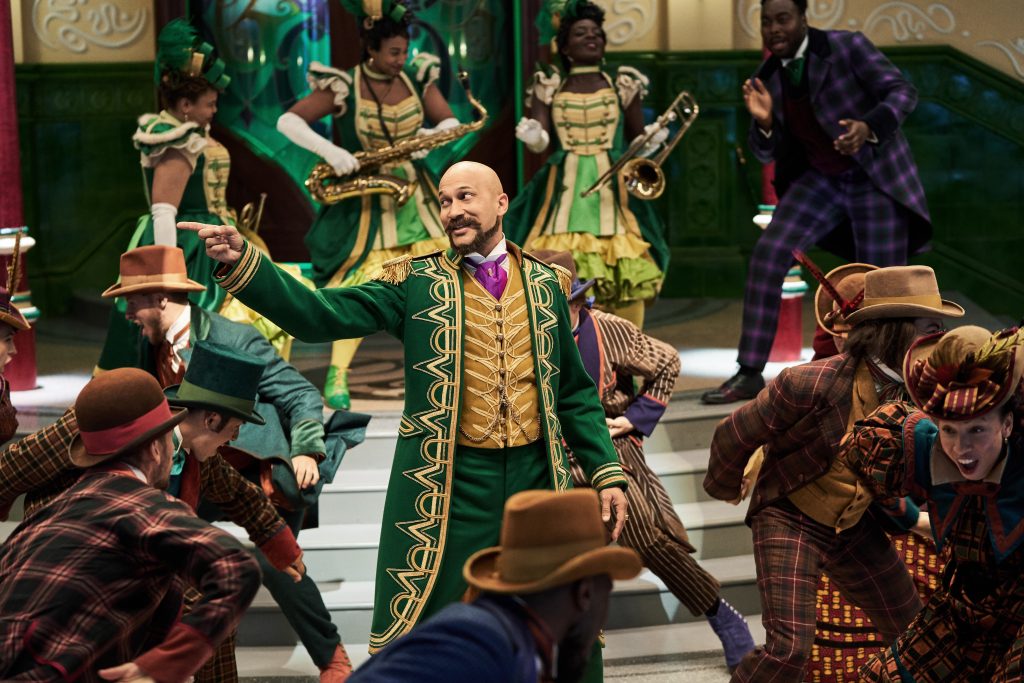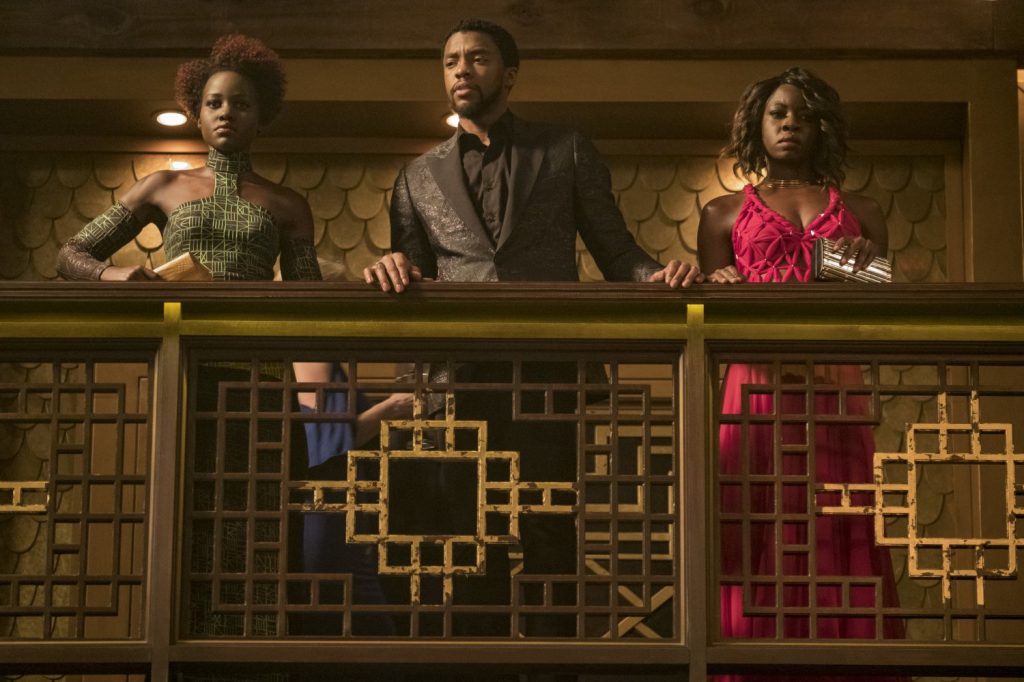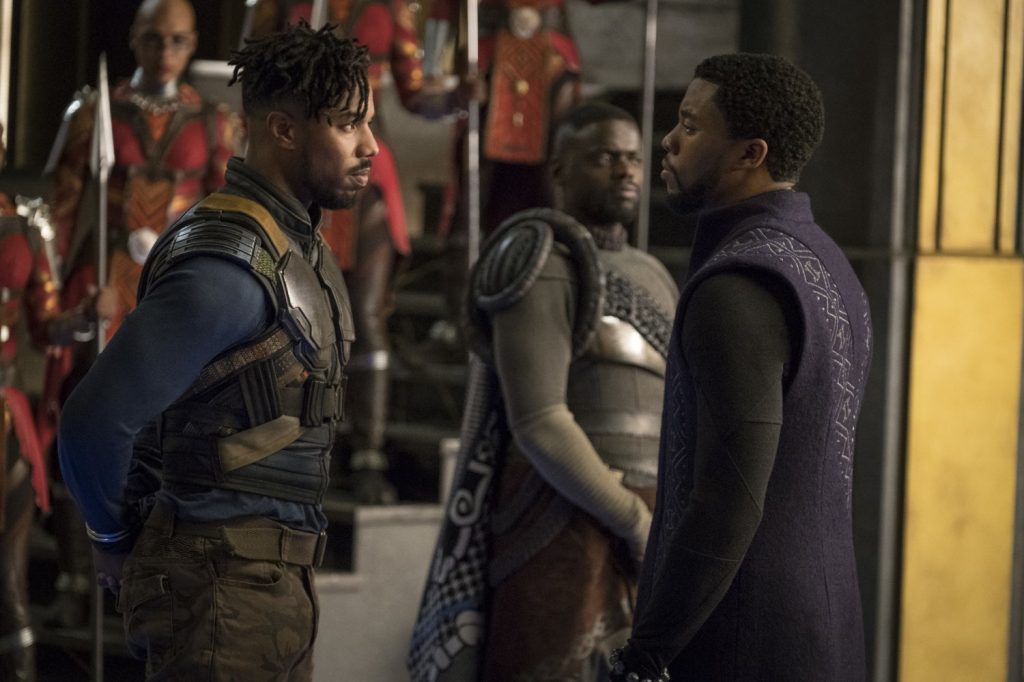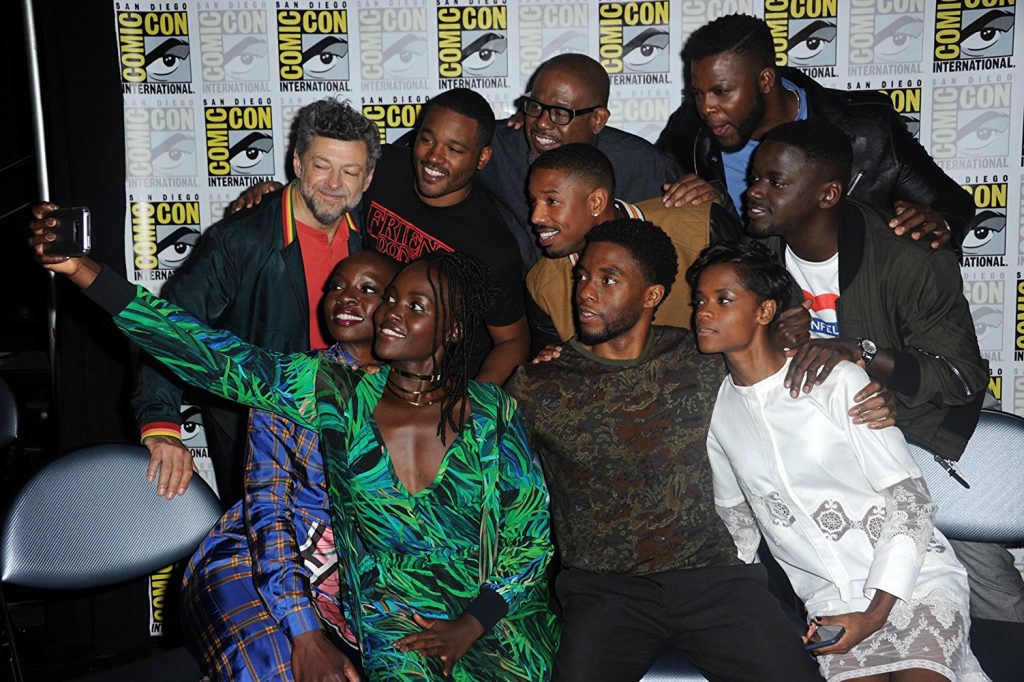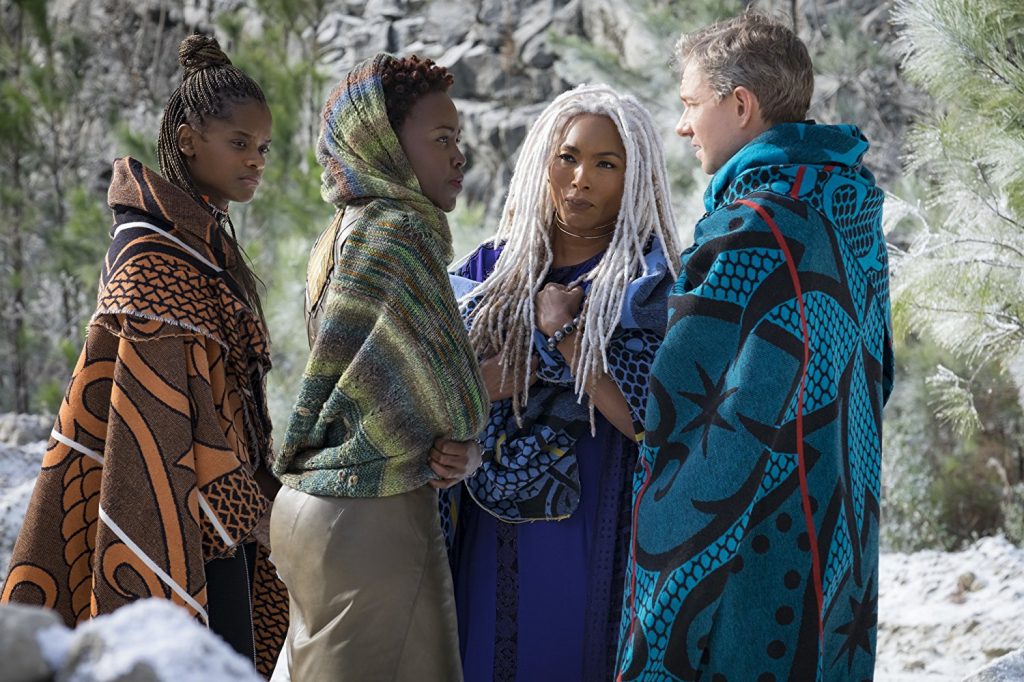April 27, 2023
by Carla Hay

“Big George Foreman: The Miraculous Story of the Once and Future Heavyweight Champion of the World”
Directed by George Tillman Jr.
Culture Representation: Taking place in various parts of the world, from the 1950s to the 1990s, the dramatic film “Big George Foreman: The Miraculous Story of the Once and Future Heavyweight Champion of the World” (based on a true events) features an African American and white cast of characters representing the working-class, middle-class and wealthy.
Culture Clash: George Foreman becomes a world-famous champion boxer, but he faced many challenges before, during, and after his fame—including poverty, a failed marriage, accusations of being a traitor to African Americans, bad business decisions, and a crisis of religious faith.
Culture Audience: “Big George Foreman” will appeal primarily to people who are fans of Foreman, boxing and sports biopics, but what this movie has to offer is often mediocre and too mushy for a story that needed to be grittier.
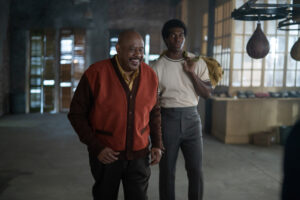
The first clue that “Big George Foreman: The Miraculous Story of the Once and Future Heavyweight Champion of the World” is going to be hokey and boring is the movie’s unnecessarily long title. This corny and awkward biopic of boxing champ George Foreman makes his unusual life look dreadfully formulaic. The entire movie is like a limp punching bag filled with nothing but hot air. Major, life-changing moments in Foreman’s life are depicted in very shallow ways, like boxes that need to be checked off in a “to do” list of drab celebrity biopics.
Directed by George Tillman Jr., “Big George Foreman” is Tillman’s movie directorial follow-up to the 2018 drama “The Hate U Give.” A vitally important and searing look at the aftermath of police brutality against black people, “The Hate U Give” is a movie that will remain relevant for years to come. “Big George Foreman” is a movie that was already made with stale and old-fashioned clichés, making it irrelevant except to people who like stale and old-fashioned celebrity biopics. Tillman co-wrote the “Big George Foreman” screenplay with Frank Baldwin, whose only previous feature-film credit is the 2019 forgettable action flick “Cold Pursuit,” starring Liam Neeson.
“Big George Foreman” is told mostly in chronological order and has frequent voiceover narration from the character of George speaking in hindsight. There are occasional flashbacks. For the purposes of this review, the real people are referred to by their last names, while the characters in the movie are referred to by their first names.
Unfortunately, this drama is plagued with cringeworthy acting from many of the cast members, most of whom don’t have realistic chemistry with each other. Khris Davis, who has the role of the adult George, doesn’t really physically look like the real Foreman. And that’s a disappointing distraction when Davis’ acting is mediocre at best.
Foreman (who was born in 1949, in Marshall, Texas) and his six siblings were raised by mother Nancy Foreman and stepfather J.D. Foreman. However, the movie makes it look like there was no father figure in George’s life. Nancy (played by Sonja Sohn) is depicted as a single mother working as a waitress in a diner and raising her kids in poverty in Houston’s tough 5th Ward area.
The movie portrays George’s sister Mary as the sibling with whom he had the closest emotional bond. Mary is played by Jordan Yarborough as a teenager and by Erica Tazel as an adult. George says in a voiceover about Mary: “She always saw the good in me. I loved her for that.”
But some of the movie’s intended heartfelt emotions are undercut by cheesy lines of dialogue. In a dining-room scene with a pre-teen George (played by Kei Rawlins) at about 11 or 12 years old, Nancy is trying not to look upset in front of the kids because she doesn’t have enough food to give them all a proper meal. George says, “I’m so hungry, I could eat this table.”
At school, young George is much bigger and taller than his classmates. He is bullied and discriminated against because everyone knows he comes from a poor family. Even a schoolteacher shows this prejudice: In a scene that takes place in a classroom, George has his hand raised to answer a question from the teacher. She looks at George’s worn-out shoes and decides to pass over George and choose a well-dressed student named Jalen Burke (played by Makario Glenn) to answer the question instead.
Later, in the schoolyard, Jalen bullies George by humiliating him about George living in poverty. Jalen sneers to anyone who’ll listen that George should change his last name from Foreman to Poorman. This insult infuriates George, who punches Jalen so hard, Jalen falls to the ground. Several times throughout the movie, it’s mentioned that George has an anger management problem.
As a teenager, George (played by Austin David Jones) almost gets arrested for mugging an undercover police officer. He narrowly escapes arrest by hiding in a sewage dump area and smearing mud all over his face, to throw off his scent from police dog nearby. This close call is enough to motivate him to join Job Corps when he hears that it’s a program where enrollees get free lodging and job training. (The movie doesn’t mention that in real life, Foreman dropped out of school at 15 years old.)
George enrolling in Job Corps is a decision that will change his life. George tells his mother about Job Corps, which would require him to move to Pleasanton, California. Nancy wants George to turn his life around from the crimes he’s been committing, so she encourages him to join Job Corps. She advises, “Do it right. Don’t come running back home because you miss me. Finish what you started.”
At the Job Corps facilities, George and several other men have to sleep in one large room with separate beds. One of the other Job Corps enrollees is a guy named Desmond, nicknamed Des (played by John Magaro), who’s much older than George, probably by 10 to 15 years. Desmond is vague about why he’s enrolled with Job Corps, but he’s an obvious alcoholic, since he’s frequently shown in the movie taking swigs from flasks of alcohol.
George is standoffish to Desmond at first when Desmond tries to befriend him. George also loses his temper when Desmond plays music on a turntable while George is trying to study. But one day, the ice between them is broken when they sit at the same table in a cafeteria.
Desmond tells George that the cafeteria has more brownies than beans because Desmond told Job Corp management that more money could be saved if brownies were bought instead of beans. Since George likes brownies, he has newfound respect for Desmond, who brags that he’s good with numbers. Later, when George becomes a successful boxer, he asks Desmond (who still has a drinking problem) to be his “money man.” And you can easily predict how that business partnership will work out.
While enrolled in Job Corps, George nearly gets expelled for violent fighting. He begs a Job Corps gym manager named Doc Broadus (played by Forest Whitaker) to let him stay in Job Corps. Doc gives George one last chance to redeem himself. Doc tells George that George should learn to channel his anger into boxing. Doc, a former boxer and a U.S. Air Force veteran, volunteers to train George. And so begins George’s journey to boxing greatness.
One person who isn’t happy to hear about George taking up boxing is his mother Nancy. When George calls her to tell her about it, she expresses worry and concern for his safety and health. However, what looks phony about this poorly written scene is that Nancy is surprised when George tells her that boxing is considered a sport. Are we supposed to believe that Nancy is that ignorant? Are we supposed to believe that she’s never heard of professional boxing? Apparently so, because when George tells her about it, she acts like she never heard of it.
It doesn’t take long for George to set big goals for himself. He tells a skeptical Doc that he wants to be in the 1968 Olympics, which is a goal that 19-year-old George accomplishes after being in boxing training for one year. And he wins the Olympic gold medal that year in the heavyweight division. George also achieves other goals that he set for himself, including defeating Joe Frazier (played by Carlos Takam), and eventually becoming a world heavyweight champion. During his rise to the top, George has a longtime professional relationship with trainer Archie Moore (played by Lawrence Gilliard Jr.), who was also a champion boxer in his heyday.
But you know a George Foreman biopic is bad when Muhammad Ali upstages George every time Muhammad is seen in the movie. Sullivan Jones has the role of Ali, who was Foreman’s biggest boxing rival for years. Jones has more physical resemblance to Ali than Davis has to Foreman, but a physical resemblance shouldn’t be the most important thing about a performance of a real person. What makes Jones’ performance as Ali so watchable (and one of the few highlights of the movie) is that he skillfully captures the voice cadence and cocky charisma of the real Ali.
Unfortunately, Davis’ portrayal of Foreman is very generic. For much of the movie, the character of George is a negative stereotype of an uneducated, angry black man who cheats on his wife. It isn’t until the last third of the film when there’s some spark to Foreman’s personality. He goes through a religious awakening and figures out that there could be more that he could be doing with his life than beating up men for a living.
But even when George shows a livelier side to himself than being a boxing brute, he just seems to be imitating Muhammad. George’s wisecracking in interviews in the latter part of the movie looks like it’s straight out of the Muhammad Ali media playbook. George’s religious awakening (he became a born-again Christian and a preacher) also pales in comparison to the real Ali, who converted from Christianity to Islam and became an outspoken activist as a result.
Meanwhile, as depicted in the movie, Foreman got some backlash from the African American community for carrying the American flag during his victory walk at the 1968 Olympics, where he won the gold medal in heavyweight boxing. That’s because there was a lot of civil unrest over how the American government was treating African Americans, and right-wingers were using the American flag as a symbol of wanting to keep government policies that violated civil rights. In “Big George Foreman,” George is seen brooding about being labeled as a “sellout” to his race. In response to this criticism, George opens community centers that do outreach to underprivileged people.
“Big George Foreman” does adequate recreations of some of Foreman’s most famous boxing matches, include his 1973 battle with Frazier that resulted in Foreman’s first world heavyweight championship title. Also recreated in the movie are the famous Rumble in the Jungle match in 1974 against Ali; the 1977 fight against Jimmy Young (played by David Jite); the 1987 comeback fight against Steve Zouski (played by Barry Hanley); the 1991 world heavyweight title match against Evander Holyfield in 1991; and the 1994 world heavyweight title match against Michael Moorer (played by Charles Brewer Jr.), which was probably the most “Foreman as the underdog” fight of Foreman’s career.
Ali and Foreman each had multiple failed marriages that ended in divorce. The 2001 biopic “Ali” (directed by Michael Mann and starring Will Smith in the Oscar-nominated title role) depicted all four of Ali’s marriages. In real life, Foreman has been married five times. “Big George Foreman” only depicts his first marriage and fifth marriage. In addition, since the movie ends in the 1990s, not all of Foreman’s 12 children are mentioned in the movie.
The movie shows George meeting his first wife Paula (played by Shein Mompremier) at the Oakland Airport in California, after he’s famous enough to be on the cover of magazines. She’s assertive and independent. When he tries to ask for her phone number, she teases him, “Your footwork is better than your pickup game.” (In real life, Foreman’s first wife was named Adrienne. They were married from 1971 to 1974.)
The marriage of George and Paula falls apart because of his chronic infidelity. The movie makes it look like all of George’s mistresses were homewrecking temptresses who aggressively pursued him. Although there’s a scene in the movie where an apologetic George expresses regrets about how he ruined his marriage to Paula by cheating on her, it’s in the context of how it’s mainly hurting him because he’s in turmoil over custody and visitation of the children he had with Paula.
George meets his fifth and current wife Mary Joan (played by Jasmine Mathews) under very different circumstances than how he met Paula. His boxing career is on the decline, and she’s wary of his romantic pursuit of her because she knows he has reputation for being a cheater. Mary Joan is also very religious. She wants George to retire from boxing if they get married. As in real life, the movie shows that Mary Joan and George got married in 1985.
So much of “Big George Foreman” just goes through the motions of the over-used story arc structure of celebrity biopics: First there’s the rise of the celebrity, then there’s the fall, and then there’s the comeback. It’s just all done in such a perfunctory way in this movie, it looks like bland chapters in a watered-down book, rather than a true cinematic storytelling experience that is revelatory and creative.
The film editing for “Big George Foreman” is sometimes choppy. In one scene that takes place in 1977, George has collapsed after his fight with Young in Puerto Rico. His colleagues tell George that they thought he was dead. George replies, “I was. Jesus Christ is alive in me.” And the next scene cuts to George being a preacher in 1978. There’s no depiction of him going through the physical recovery of this near-death collapse.
Whitaker turns in a fairly good performance as boxing trainer Doc, but Whitaker is really not doing anything new or exciting in “Big George Foreman,” because he’s played “tough but tender” mentors before in many other on-screen roles. The character of Desmond is oddly placed. He’s in several scenes in George’s rise to the top. But then, Desmond is not seen or mentioned for a long stretch of the movie, until Desmond makes an appearance for one of the movie’s most melodramatic sequences that takes place in the 1980s.
One of the most incongruous things about “Big George Foreman” is that it makes a big deal out of showing that George’s mother Nancy and George’s fifth wife Mary Jane were opposed to George’s boxing, out of concerns for his safety and health. However, when George is on the comeback trail in his 40s, there’s a big disconnect in this narrative: Nancy and Mary Jane are shown enthusiastically cheering on George at a time in his life when his health was even more at risk as a professional boxer, because of his age and overweight physique. The movie gives no explanation for this drastic change in attitude from Nancy and Mary Jane.
“Big George Foreman” has some attempts at comedy that look like ideas that were rejected from a second-rate sitcom. Even the story of the George Foreman grill business is rushed through the movie and depicted as a fluke idea that Foreman did not predict would become the success that it became. “Big George Foreman” takes a larger-than-life story and shrinks it into something that ends up becoming a basic “by the numbers” biopic with too much unrealistic sappiness and not enough authentic grit.
Affirm Films will release “Big George Foreman: The Miraculous Story of the Once and Future Heavyweight Champion of the World” in U.S. cinemas on April 28, 2023.



